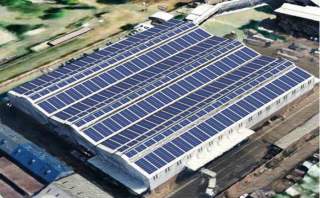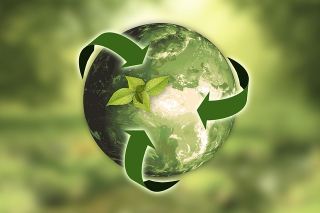Electrolux South Africa to power 80% of production with new solar energy system
- Electrolux invests R16 million in new 1 MW solar system at Benoni factory.
- Carbon footprint to be slashed by 40% through solar energy.
- Green energy powered electric forklifts to replace diesel in three years.
Electrolux South Africa has embarked on its journey to exit the national electricity grid and move to renewable solar energy, cutting the organisation’s carbon footprint at its local Kwikot water heater (geyser) manufacturing plant by an impressive 40%.
Ughard de Clercq, lean engineer at Electrolux South Africa said the organisation was expected to complete the development of a major 1 MW solar energy system at its Benoni factory by November 2021. The company has invested R16 million in the solar system which it started building in July 2021.
“We plan to be climate neutral by 2030 in all our manufacturing operations. So far, we have implemented a 112 kWp solar system for our offices in 2020 and have saved over 96 tons of CO2 just this year. We expect that the 1 MW solar system will reduce our manufacturing CO2 footprint by 40%,” said de Clercq. Once completed, the solar system will comprise 1278 solar panels that will power the factory during the day, supplying as much as 80 to 90% of the plant’s energy requirements. The organisation also intended exploring the possibility of purchasing renewable energy from Eskom, to meet its night time electricity requirements when the parastatal is ready to offer privately produced green energy as an option said de Clercq.
“We did not develop more than one megawatt due to the roof space and current regulations limiting the amount of electricity generated via a solar system, but the government is looking to increase it,” he added.
When limits were increased to 100MW or more, Electrolux would also investigate extending its solar system so that it could sell power back to the electricity grid. “If the local law and infrastructure allows it, we would want to sell the excess green electricity back into the grid. We would like to be able to make a contribution to other organisations by supplying them with green energy,” he said. Electrolux would likely also explore installing smaller solar energy systems at its geyser distribution centres around South Africa.
“We plan in the next two to three years to start reducing the consumption of our fossil fuels by switching from diesel to electric forklifts that can be charged by our solar system,” said de Clercq.
“We are also investigating how to reduce our water consumption in the future by harvesting the rain water to reduce our environmental impact even further.” This latest investment in solar energy at its local factory was part of the organisation’s global strategy to achieve its ‘better living’ 2030 goal of zero carbon emissions, partially by using renewable energy in production. The investment also follows similar solar systems installed at the company’s plants in China, Thailand and Australia.
“We strive not only to manufacture sustainable products such as our appliances, but to manufacture them in a sustainable way. It is important to look after the environment and do our part for future generations to come,” commented Murray Crow, Electrolux South Africa’s Managing Director.
-- ENDS --
Distributed by EchoSquare on behalf of the WWF. For more information, please contact Kerry Webb at This email address is being protected from spambots. You need JavaScript enabled to view it. or 082 496 0713
Easy Ways To Reduce your Personal Carbon Footprint
There is a lot of conversation taking place now about companies needing to reduce their carbon emissions or pay Carbon Tax, while not very much is being said about the need for individuals to reduce their personal greenhouse gas emissions. Human activity produces over 40 billion tonnes of carbon dioxide into the atmosphere each year, and a significant percentage of that is from individual activity. Luckily, each one of us can start to make easy changes which, cumulatively, can have a big impact on those numbers.
- Eat less meat. Livestock farming contributes 14.5% to global manmade greenhouse gas emissions,
- Drive less – the average car produces 5 tonnes of CO2 per year,
- Fly less - worldwide CO2emissions from commercial flights are rising up to 70% faster than predicted by the UN, according to an analysis,
- Switch off and unplug devices when not in use,
- Eliminate or at least, reduce single-use plastic,
- Buy less fast fashion – it is estimated that the clothing industry is responsible for 10% of global greenhouse gas emissions,
- Reduce and reuse – around 80% of a product’s carbon footprint is wrapped up in the production process,
- Take shorter showers -we could save million of tonnes of CO2 a year if we all took one minute off our shower time,
- Switch to energy-saving lightbulbs – these use up to 80% less energy than standard bulbs,
- Plant a Spekboom – this environmental miracle worker can absorb carbon emissions like no other plant.
Reducing Your Company’s Carbon Footprint Makes Business Sense
Reducing the environmental impacts of your business operations (such as greenhouse gas emissions, air pollution, and highwater use) has a positive impact on your bottom line because energy efficient practices reduce operating costs. The added benefits of improved employee productivity, being able to offer more sustainable products and higher brand reputation from being recognized as an environmentally and socially responsible company add to profitability as well.Fortunately, small steps taken to reduce your company’s carbon footprint (reducing the greenhouse gas emissions that are directed into the atmosphere from human activities) can have an incremental impact.
The 5 simplest ways to reduce your emissions are:
Reduce company travel
Where possible, substitute attendance at meetings for communication via web and video conferencing. Allow the staff members who do not need to be in the office all day, every day, to work from home.
Turn off the electricity
Unplug devices at the end of the day and set them to sleep during periods of inactivity. Turn off the lights when you leave a room, too.
Purchase energy-efficient supplies and appliances
In the United States, it is estimated that, if every office product purchased was energy certified that would be the equivalent of taking 158 000 cars off the road. Energy-saving equipment also cost less to run.
Reduce your waste
Waste reduction saves money through a reduction in purchases and less need for waste removal.
Buy green. For many companies, a large portion of their emissions are passed up to them from their supply chain. Procuring from organisations that are green will likely have reduced their emissions which your company will benefit from.
Start small but start. Your business will thank you
Website: www.5inc.co.za



